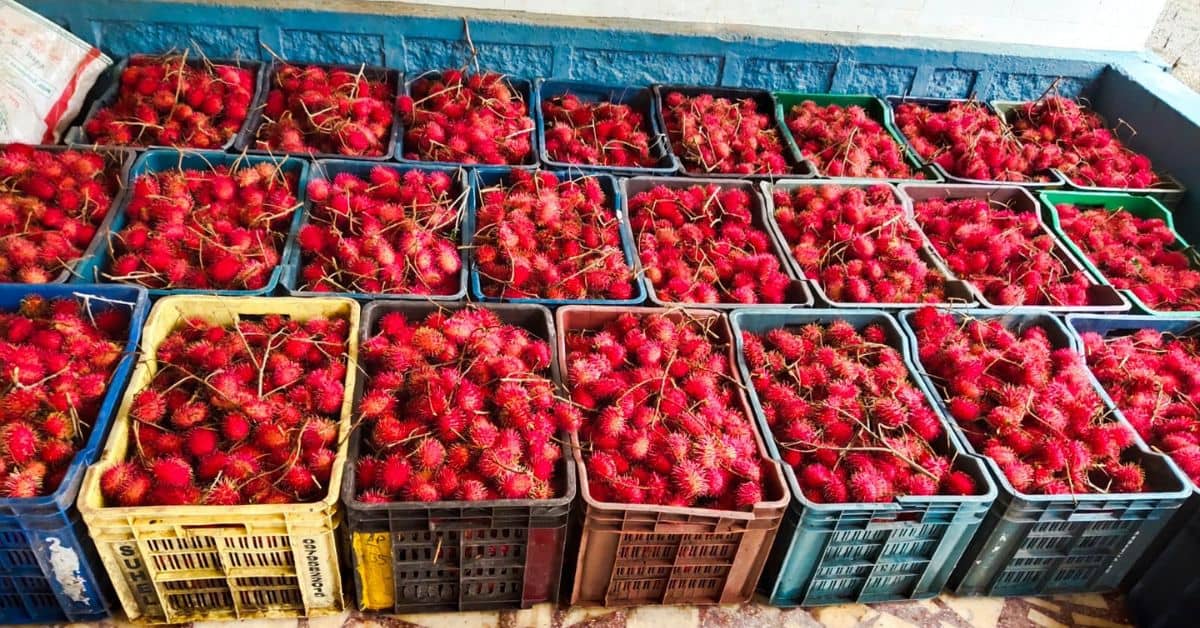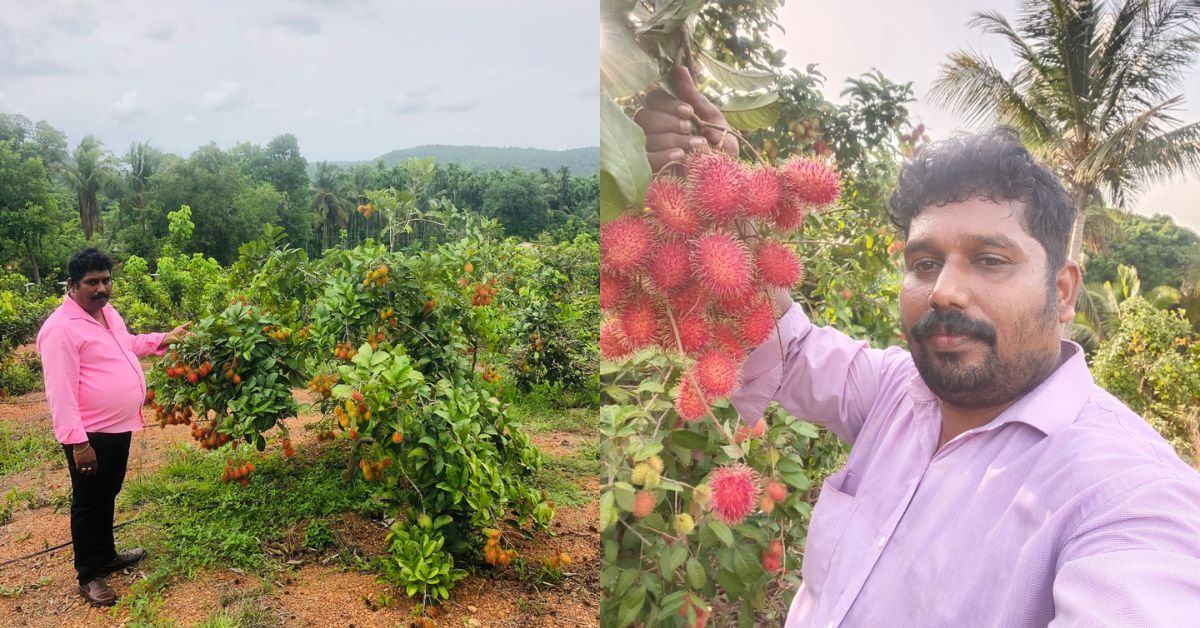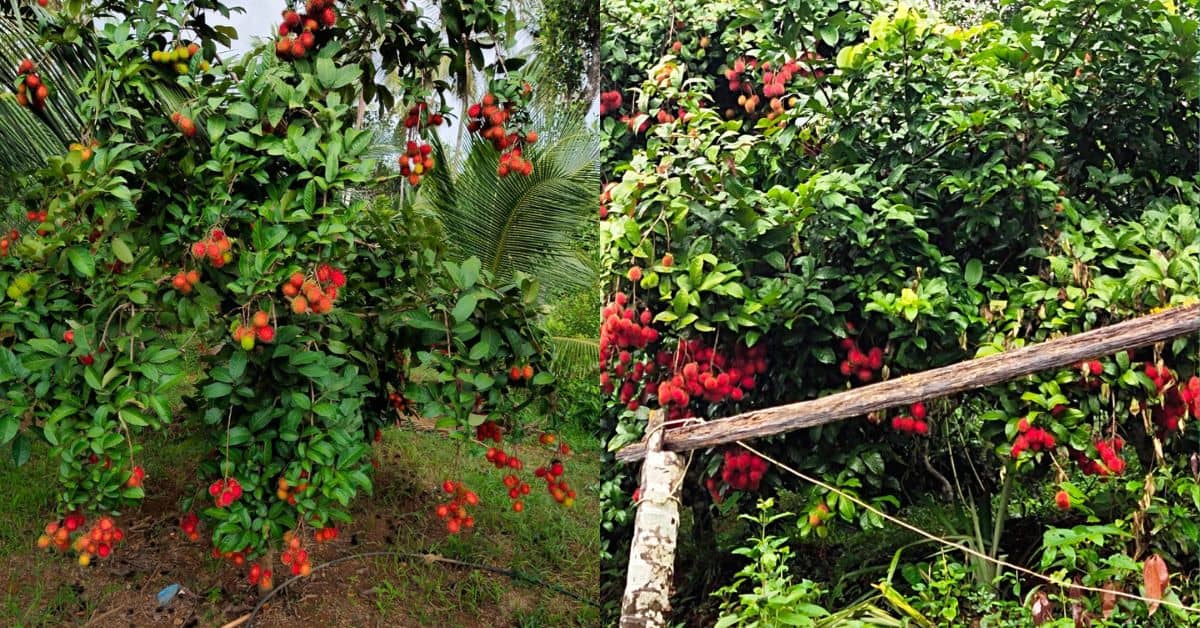In the serene countryside of Kadaba in Karnataka’s Mangaluru, amidst lush green fields and swaying coconut palms, lies a farm painted in the vibrant colours of exotic fruits. The red and green rambutans, accompanied by the dark purple mangosteens, often beckon passers-by with a story of resilience and success. Together, they generate nearly Rs 1 crore in annual revenue for 42-year-old Lohith Shetty.
Born into a farming family, Lohith’s story is one of rags to riches. He saw his father and uncles toil on their 21-acre farm, growing rubber, coconuts, areca nuts and cashews. Despite having bigger aspirations as a child, financial challenges led him to discontinue his education after Class 10, prompting him to focus on finding ways to supplement his family’s income.
After having tried his hand at different businesses, including a small shop and a restaurant, Lohith’s journey to becoming a millionaire would begin when he travelled to Dharmasthala to work on a farm.
Exotic fruits, new beginnings
Still struggling to make ends meet for his family, Lohith took up a job at a stone quarry. While he was working there, he would get a work reference from a friend — a reference that would change his life.
Over the next decade, Lohith’s job at a farm in Dharmasthala, about an hour’s drive away from his hometown, would give him access to the know-how of cultivating exotic fruits like rambutan, dragon fruit, and mangosteen. This would become his front-row ticket to understanding progressive agricultural practices and novel methods to make farming a profitable venture.

“I worked for 10 years in an estate that grew rambutan and mangosteen. I got an idea about how these fruits are grown, where they come from, the ideal conditions for their growth and more,” Lohith tells The Better India.
After returning home in 2016 with his newfound knowledge, refined through years of hard work, Lohith decided to transform his expertise into a profitable enterprise. Along with him, he had brought back a bunch of rambutan, mangosteen and dragon fruit seeds and cuttings.
He began by leasing 20 acres of land. With the 21 acres his family already owned, he now had 41 acres to work with. The next step was to source more plants, which he did from a nursery in Kerala. In the next eight years, Lohith steadily capitalised on his advantage of being one of the first growers of exotic fruits in his region.
Today, apart from catering to his own farm and nursery, Lohith also helps people interested in growing such crops and vegetables. His ventures help him earn over Rs 1 crore every year.
Organic oasis: Creating the perfect environment
Fruits like rambutan, mangosteen and dragon fruit are usually grown in Kerala, and sell for high prices, earning farmers a hefty profit. However, without the right conditions, yielding a good crop might become a tricky affair. Like any other plants, water, sunlight, and shade are key to growing such fruits.
“Rambutan needs more humidity to survive. It doesn’t grow in very hot areas. Dragon fruit and rambutan don’t grow in shade. You need to create the perfect environment for it. Mangosteen, on the other hand, grows well with shade,” Lohith explains, adding that the right amount of water is also imperative.

These plants yield good harvests three years after they are first planted. One rambutan plant produces about 45 kg per year, while one dragon fruit plant yields approximately 300 fruits annually.
Lohith grows rambutan on 12 acres of land, has 500 dragon fruit plants and uses mangosteen as an intercrop in his existing areca nut plantation. He sells the rambutan for Rs 180 to Rs 300 per kg, mangosteen for Rs 350 to Rs 750 per kg, and dragonfruit for Rs 100 to Rs 150 per kg.
And to grow all of these, Lohith has taken an organic route. He uses neem cakes, cow dung, goat droppings and even chicken manure for his plants. Additionally, he employs drip irrigation and fertigation to provide the correct amount of water and fertiliser for each plant.
Apart from buyers visiting his farm directly to buy fruits, he also supplies customers in Bengaluru, Chennai, Hyderabad, Coimbatore, Mumbai, and across Kerala.

While sales were very good this year, Lohith attributes it to a good yield. However, the yield might not be the same every year. Climate change leading to erratic rainfall has caused it to vary in certain years, he explains.
When Lohith is not working his farm, he runs a nursery, selling rambutan, mangosteen and durian plants. He also manages plants for others who wish to grow these exotic fruits. “We make the plants, maintain it for three years, and once it starts giving a good yield, the owners take over,” he says.
From dropping out of school to becoming a millionaire, Lohith Shetty’s journey is a testimony to the power of innovation, resilience, and hard work.
Edited by Arunava Banerjee; Images courtesy Lohith Shetty
No comments:
Post a Comment